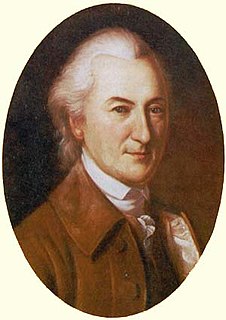A Quote by Alexander Pope
Awake, my St. John! leave all meaner things To low ambition and the pride of kings. Let us (since life can little more supply Than just to look about us, and to die) Expatiate free o'er all this scene of man; A mighty maze! but not without a plan.
Related Quotes
Change may be the vitalizing wind blowing through the house of life, but it is not an abiding force. We need permanent things to soak peace into us as well as progress - the beauty of the earth, seedtime and harvest, the smiles of lovers, the joy of the young in being alive, pride in craftsmanship. Why, oh why must we let ourselves forget these lasting treasures in an age of consuming ambition, speed madness and accumulated goods that leave us no chance to live? If we cannot be contented with a little no wealth will ever satisfy us.
The millions are awake enough for physical labor; but only one in a million is awake enough for effective intellectual exertion, only one in a hundred million to a poetic or divine life. To be awake is to be alive. I have never yet met a man who was quite awake. How could I have looked him in the face? We must learn to reawaken and keep ourselves awake, not by mechanical aids, but by an infinite expectation of the dawn, which does not forsake us in our soundest sleep. I know of no more encouraging fact than the unquestionable ability of man to elevate his life by conscious endeavor.
Since my first discussions of ecological problems with Professor John Day around 1950 and since reading Konrad Lorenz's "King Solomon's Ring," I have become increasingly interested in the study of animals for what they might teach us about man, and the study of man as an animal. I have become increasingly disenchanted with what the thinkers of the so-called Age of Enlightenment tell us about the nature of man, and with what the formal religions and doctrinaire political theorists tell us about the same subject.
You all say you need us. Well, maybe you do, but not to help, with the millions of bubbly new minds about to be unleashed, with all the cities coming awake at last. Together, you're more than enough to change the world without us. So from now on, David and I are here to stand in your way. You see, freedom has a way of destroying things.
Service is selflessness--the opposite of the lifestyle that we see so much of in America today. The things that entertain us don't often lift us up, or show us as the people we can rise up to become. The people who appear in this book--and others who did things I can't talk about--are my role models. They quietly live out the idea expressed in the Bible (John 15:13): "Greater love has no man than this, that a man lay down his life for his friends.
And since the mind is of a man one part,
Which in one fixed place remains, like ears,
And eyes, and every sense which pilots life;
And just as hand, or eye, or nose, apart,
Severed from us, can neither feel nor be,
But in the least of time is left to rot,
Thus mind alone can never be, without
The body and the man himself, which seems,
As 'twere the vessel of the same- or aught
Whate'er thou'lt feign as yet more closely joined:
Since body cleaves to mind by surest bonds.
Most of the things at the zoo don't look like us. We're one design that works. Our chimp pals sort of look like us, so that's a different take on the same basic design. But fish don't look like us, and giraffes don't. They look a little like us, but not too much. And insects certainly don't look like us, and they work just fine.
I am not talking about what every one of us means by love. Little namby-pamby love is lovely. Man rails in love with woman, and woman goes to die for man. The chances are that in five minutes John kicks Jane, and Jane kicks John. This is a materialism and no love at all. If John could really love Jane, he would be perfect that moment.
Let us not look east and west for materials of conversation, but rest in presence and unity. A just feeling will fast enough supply fuel for discourse, if speaking be more grateful than silence. When people come to see us, we foolishly prattle, lest we be inhospitable. But things said for conversation are chalk eggs. Don't say things. What you are stands over you the while, and thunders so that I cannot hear what you say to the contrary.
I discovered a version of the sinner's prayer that increased my faith far more than the one that I had said years earlier...In this version, there were no formulas, no set phrases that promised us safe passage across the abyss. There was only our tattered trust that the Spirit who had given us life would not leave us in the wilderness without offering us life again.
Kings or parliaments could not give the rights essential to happiness... We claim them from a higher source - from the King of kings, and Lord of all the earth. They are not annexed to us by parchments and seals. They are created in us by the decrees of Providence, which establish the laws of our nature. They are born with us; exist with us; and cannot be taken from us by any human power, without taking our lives.





































